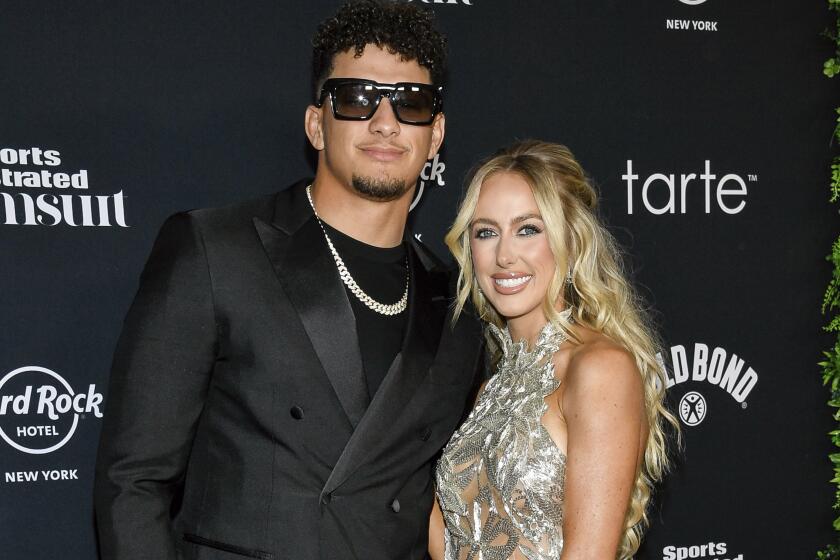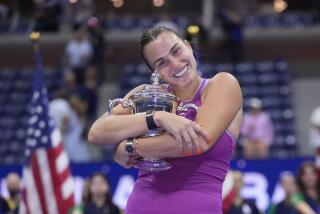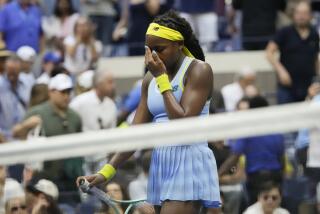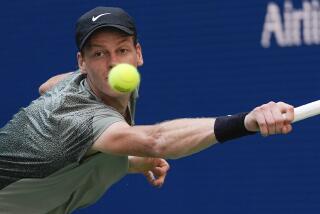Jessica Pegula wins at U.S. Open, setting up title showdown with Aryna Sabalenka

NEW YORK — Jessica Pegula could do no right at the outset of her first Grand Slam semifinal. Her opponent at the U.S. Open on Thursday night, Karolina Muchova, could do no wrong.
“I came out flat, but she was playing unbelievable. She made me look like a beginner,” Pegula said. “I was about to burst into tears, because it was embarrassing. She was destroying me.”
Pegula managed to shrug off that sluggish start and come back from a set and a break down to defeat Muchova 1-6, 6-4, 6-2 for a berth in the final at Flushing Meadows. The No. 6-seeded Pegula, a 30-year-old from New York, has won 15 of her last 16 matches and will meet No. 2 Aryna Sabalenka for the title Saturday.
Sabalenka, last year’s runner-up to Coco Gauff at the U.S. Open, returned to the championship match by holding off a late push to beat No. 13 Emma Navarro of the United States 6-3, 7-6 (2).
Former President Trump praises Patrick and Brittany Mahomes before the Chiefs’ opener Thursday against the Ravens. Trump is predicting another Chiefs Super Bowl berth.
It will be a rematch of last month’s final at the hard-court Cincinnati Open, which Sabalenka won — the only blemish on Pegula’s post-Olympics record.
“Hopefully I can get some revenge out here,” said Pegula, whose parents own the NFL’s Buffalo Bills and NHL’s Buffalo Sabres. “Playing Aryna is going to be really tough. I mean, she showed how tough she is and why she’s probably the favorite to win this tournament.”
Things did not look promising for Pegula early Thursday. Not at all.
Muchova, unseeded after missing about 10 months because of wrist surgery, employed every ounce of her versatility and creativity, the traits that make her so hard to deal with on any surface. The slices. The touch at the net. The serve-and-volleying. Ten of the match’s first 12 winners came off her racket. The first set lasted 28 minutes, and Muchova won 30 of its 44 points.
After grabbing eight of the first nine games, Muchova was a single point from leading 3-0 in the second set. But she couldn’t convert a break chance there, flubbing a forehand volley off a slice from Pegula, and everything changed.
“I was thinking, ‘All right. That was kind of lucky. You’re still in this,’” Pegula said. “It comes down to really small moments that flip momentum.”

Quickly, the 52nd-ranked Muchova went from not being able to miss a shot to not being able to make one. And Pegula turned it on, heeding her two coaches’ advice to mix up her serves and her spins and to go after Muchova’s backhand more. Most of all, Pegula demonstrated the confident brand of tennis she used to eliminate No. 1 Iga Swiatek, a five-time major champion, in straight sets Wednesday. Pegula had been 0-6 in major quarterfinals before that breakthrough.
Took Pegula a while to play that well Thursday, but once she got going, whoa, did she ever. All told, she collected nine of 11 games, a span that allowed her to not merely flip the second set but race to a 3-0 edge in the third.
“I was able to find a way, find some adrenaline, find my legs. And then at the end of the second set, into the third set, I started to play like how I wanted to play. It took a while,” Pegula said. “I don’t know how I turned that around.”
Muchova, a 28-year-old from the Czech Republic, hadn’t ceded a set in the tournament. But she began to fade. After going 7 for 7 on points at the net in the first set, she went 15 for 29 the rest of the way. After only seven unforced errors in the first set, she had 33 across the second and third.
And all the while, the Arthur Ashe Stadium crowd that was flat at the beginning — save for the occasional cry of “Come on, Jess!” — was roaring.
When things suddenly got quite tight in the second set of the first semifinal, and spectators suddenly got quite loud while pulling for Navarro, Sabalenka found herself flashing back to last year, when a rowdy Ashe crowd backed Gauff vociferously.
“Last year it was a very tough experience. Very tough lesson. Today in the match, I was, like, ‘No, no, no, Aryna. It’s not going to happen again. You have to control your emotions. You have to focus on yourself,’” said Sabalenka, a 26-year-old from Belarus who was the champion at the last two Australian Opens.

Using her usual brand of high-risk, high-reward tennis, Sabalenka produced 34 winners and 34 unforced errors — punctuating most of her groundstrokes with a yell — and, in a fitting bit of symmetry, Navarro had 13 winners and 13 unforced errors.
Navarro did not fold in the second set, despite trailing for much of it, and as the noise around her grew, she broke when Sabalenka attempted to serve for the victory at 5-4.
“I wasn’t ready for the match to be over,” Navarro said.
But in the tiebreaker that followed, Sabalenka took over after Navarro led 2-0, grabbing every point that remained.
“I kind of got my teeth into it there at the end of the second set,” said Navarro, who got past Gauff in the fourth round, “and I felt I could definitely push it to a third. Wasn’t able to do so.”
When it ended, thousands of ticket-holders saluted Sabalenka for her latest show of mastery on a hard court; she’s now into her fourth straight final at a major held on that surface.
“Well, guys, now you are cheering for me,” Sabalenka said with a laugh. “Well, it’s a bit too late.”
More to Read
Go beyond the scoreboard
Get the latest on L.A.'s teams in the daily Sports Report newsletter.
You may occasionally receive promotional content from the Los Angeles Times.











